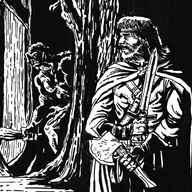At the start of combat, make a Dexterity Saving Throw. On a success (lower than your Dexterity Defense), you go before any enemies, otherwise, you go after. Reroll initiative every round.
During a round, you can take 2 Actions. An action can be attacking, moving 40 ft., using an item, etc.
Melee Attacks
In melee combat, both the attacker and defender roll d20+STR. Whoever rolls higher may deal their damage, if the roll is also greater than the opponent's armor.
Ranged Attacks
The attacker rolls d20+WIS. If this roll is greater than the opponent's armor, deal damage. The opponent may, if they are still alive, make a counter shot, if it makes sense in the fiction and they have a suitable weapon available.
Hitting
Roll your weapon's damage die. When dual-wielding, roll both damage dice and pick the highest result. If the attacker rolls a Nat 20 or the defender rolls a Nat 1, the hit is a critical hit; roll an additional damage die. Note that a Shield can be sacrificed to negate the damage from a single blow.
Advantage in Combat
When a character has advantage against an opponent on their combat turn, they may either:
- Apply advantage to their attack roll or maneuver, letting them choose the higher of two dice rolls.
- Make an attack without advantage, but deal damage and apply the effects of a maneuver.
- Attack without advantage, but prevent the target from counter-attacking.
Ranger's Skill
Rangers are, despite their stoic nature, trained in the art of combat. If you successfully land at least one melee attack during your turn, each enemy creature with less HD than the Ranger's level automatically suffers the Ranger's melee weapon damage. This represents the deft and unpredictable strikes a Ranger makes in the heat of combat.
